Town Manager will look into creating ordinance
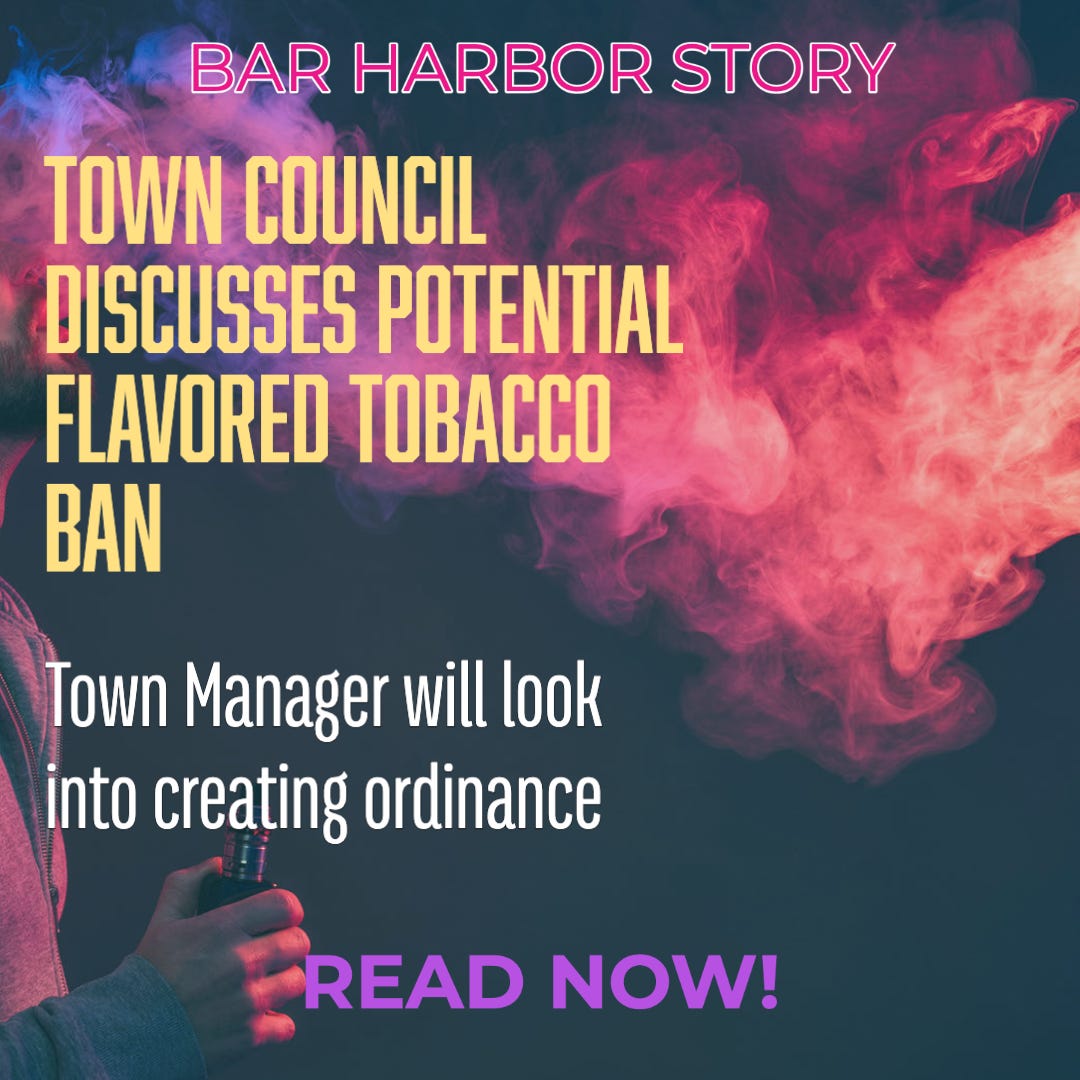
BAR HARBOR—Councilor Joe Minutolo said one of his long-term employees recently gave up vaping and told Minutolo how it had been a habit that had consumed him and how when he decided to quit, he found it extremely difficult. He also shared that experience to Minutolo’s other employees, some who Minutolo believed were on the edge of starting.
“Once you go down that road, getting off that road is an incredibly hard thing to do,” he told other town councilors during their meeting Tuesday night. He added his son barely went into the restrooms at the high school because it’s so popular in the restrooms. “It’s a huge issue. There’s no question.”
At the Bar Harbor Town Council meeting, Councilor Gary Friedmann introduced Arthur Blank, former CEO of MDI Hospital and Friends of Acadia Board member to discuss a potential town ban of flavored tobacco products. It is currently against state law to sell tobacco products to people under 21.
“This is a significant issue particularly at the high school right now,” Friedmann said.
He said that he’d met with Blank and Town Manager Kevin Sutherland about the issue prior to the council meeting.
Blank said that slowing the spread of nicotine addiction was going well until recently, and that this was partially true because the tobacco industry has been able to market its design and product to kids. “It’s become a major challenge for the high school as well as others.”
One way of dealing with it is to get the products out of the stores in town, he said.
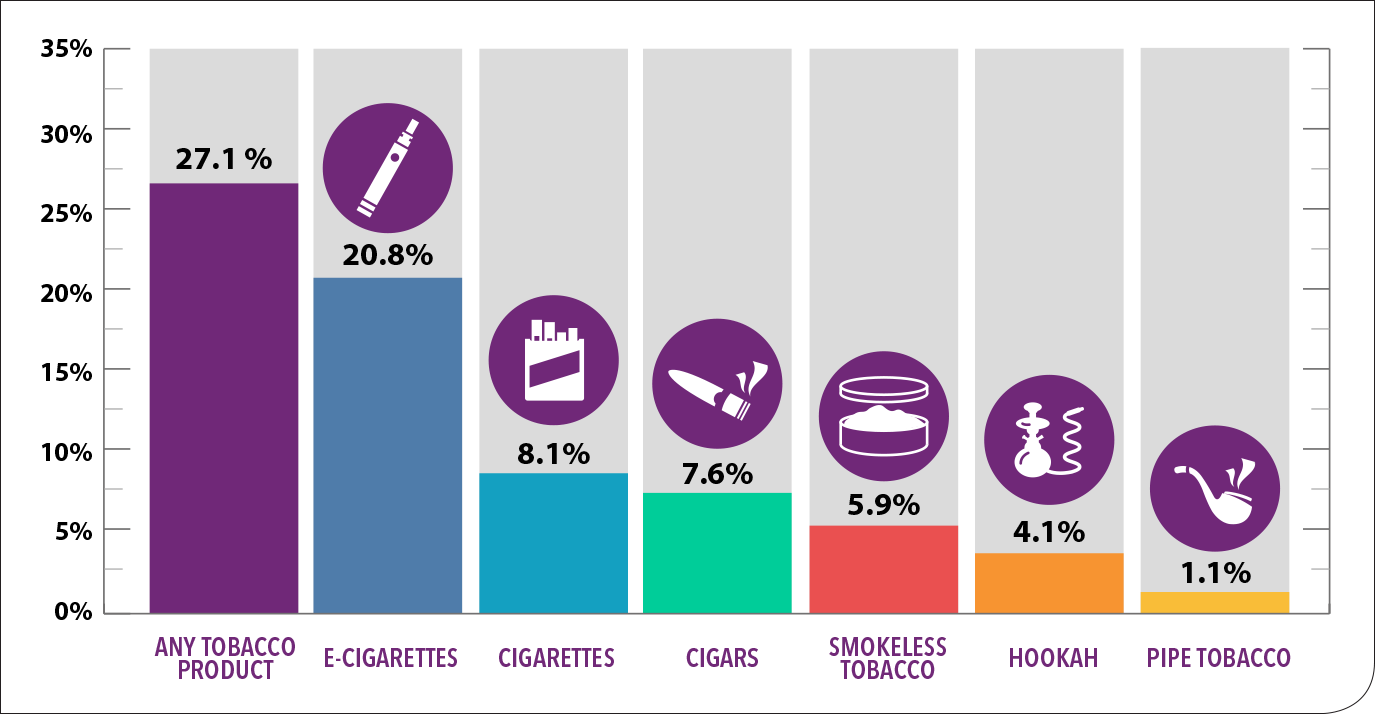
According to the Federal Food and Drug Administration,
“Flavors are added to tobacco products to improve flavor and taste by reducing the harshness, bitterness, and astringency.1-2
“However, the use of flavors in tobacco products raises important public health questions. For example, FDA is aware of early reports that some flavors could help adult cigarette smokers switch to potentially less harmful tobacco products.3-5 On the flip side, research has shown that sweet-tasting flavors are particularly appealing to youth and young adults.6-10
“FDA has already banned cigarettes with certain kid-appealing flavors and has announced that it plans to propose tobacco product standards to ban menthol as a characterizing flavor in cigarettes and ban all flavors (including menthol) in cigars.
“In April 2021, FDA announced its plans to propose tobacco product standards within the next year to ban menthol as a characterizing flavor in cigarettes and ban all characterizing flavors (including menthol) in cigars.”
Julie Daigle, community health and development coordinator for Healthy Acadia was the main presenter of the meeting and extolled tobacco’s addictive properties especially on people under 24.
“If you don’t start when you’re a young person, you’re probably not going to start at all,” she said, stressing that she believes that tobacco companies know this and have developed 15,500 flavors to market to kids. Menthol, they hope, would be included in the flavor ban though many don’t think of it as a flavor.
“Menthol makes it easier to start and harder to quit using tobacco,” she said and it masks the harsh taste and numbs the user’s throat, which makes it easier to inhale the smoke more deeply into the longs. “Menthol cigarettes are the most dangerous flavored tobacco product of all.” It’s not actually an adult product. Half of youth who have tried smoking began with menthol, she said.
Daigle said the tobacco industry has a lot of money and a lot of influence on the state and federal levels, which is why municipalities can reflect their communities’ priorities.
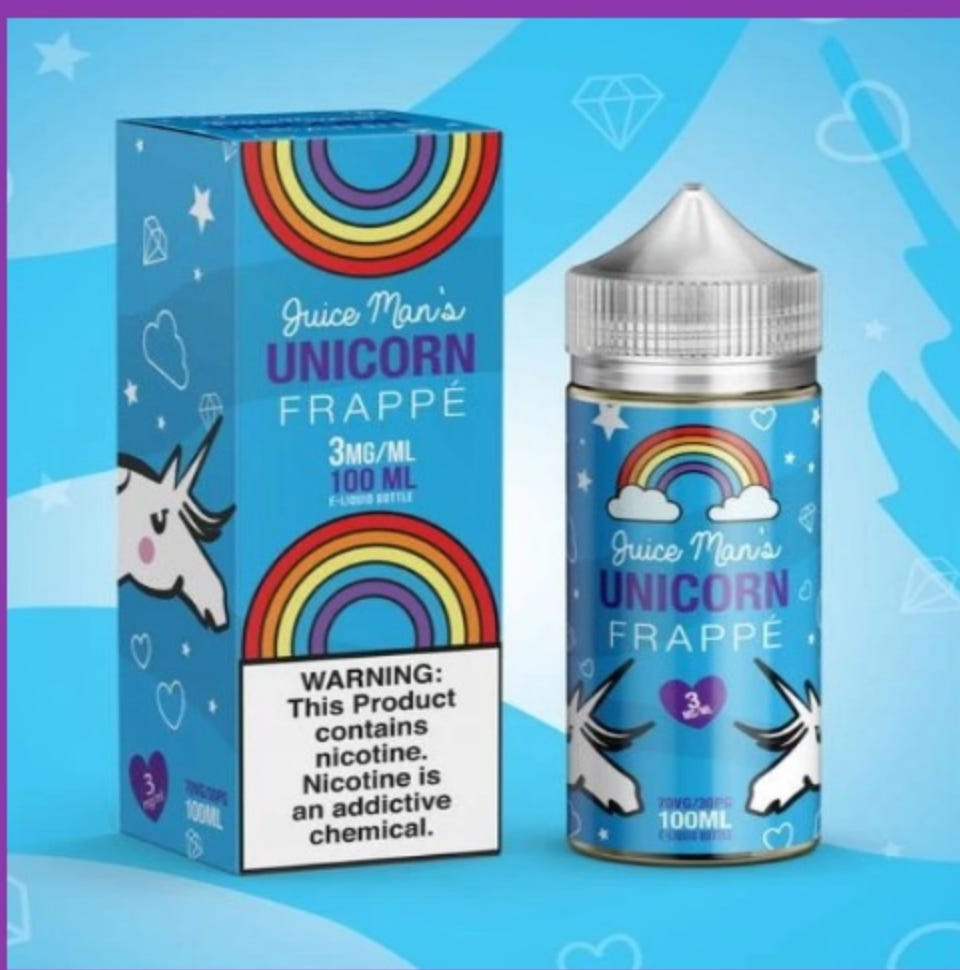
Flavored tobacco products are banned or about to be in Bangor, Brunswick, Portland, and South Portland. There is a bill before the state legislature (submitted by Portland Democratic State Sen. Jill Duson) that would ban flavored tobacco products statewide. Similar bills went before the state in other sessions. Massachusetts banned flavored tobacco in 2020. California’s ban on most flavored tobacco went into effect this week after court challenges
Councilor Erin Cough asked why not a full-scale goal of banning tobacco, saying that it’s either a health issue for everyone or not.
Councilor Jill Goldthwait said that while a full ban is a laudable goal, she didn’t want to tie that to this potential ordinance and slow down its potential passage. Keeping people from starting might be the number one goal, Council Chair Valerie Peacock said, and was a good place to put energy and work. Later during the meeting during council comments, Peacock mentioned all the behinds-the-scene work that the town staff does to get things done.
Opponents of bans, such as the libertarian Reason Foundation in Massachusetts, say that bans on tobacco products reduce state coffers.
“The New England Convenience Store and Energy Marketers Association (NECSEMA) has crunched the numbers for the first six months of the ban —and it’s not looking good.
“From June 2020 to November 2020, Massachusetts cigarette excise tax stamp sales fell 24 percent, with $62 million in revenue lost. When including lost sales taxes, that figure rises to $73 million.
“These figures do not include Massachusetts’ losses from other flavored products like cigars, smokeless tobacco, pipe tobacco, or e-cigarettes so they represent an underestimate of the state’s overall revenue losses, with the comprehensive figure possibly breaching $100 million in lost revenue.”
The CDC writes that the cost of cigarette smoking (only) in the United States was over $600 billion in 2018 and that youth using tobacco products (any) is unsafe, and wrote, “If cigarette smoking continues at the current rate among youth in this country, 5.6 million of today’s Americans younger than 18 will die early from a smoking-related illness. That’s about 1 of every 13 Americans aged 17 years or younger who are alive today.”
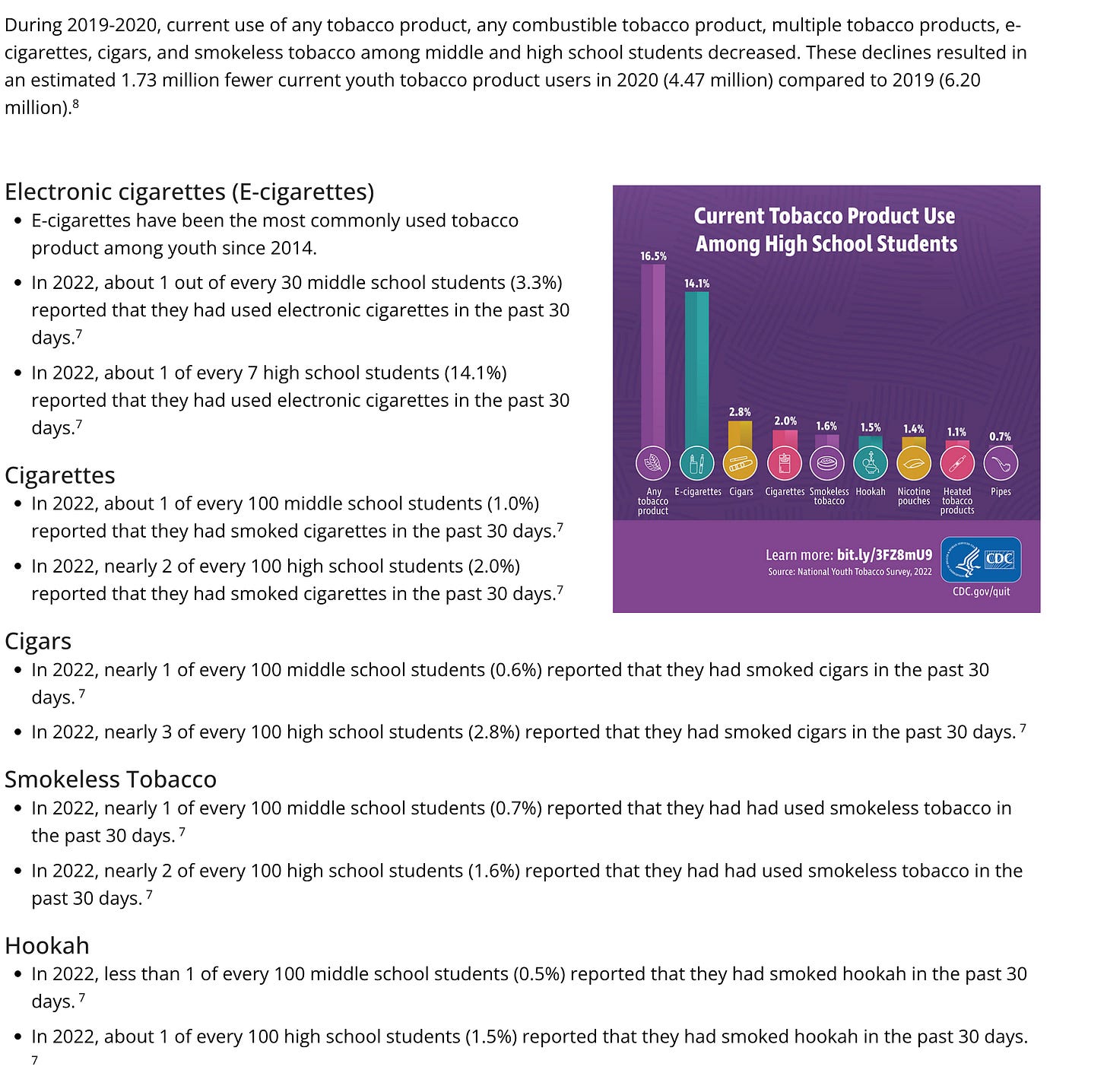
According to the CDC,
“Tobacco use is the leading cause of preventable disease, disability, and death in the United States. Nearly 40 million U.S. adults still smoke cigarettes, and 3.08 million middle and high school students use at least one tobacco product, including e-cigarettes. Every day, about 1,600 U.S. youth younger than 18 years smoke their first cigarette. Each year, nearly half a million Americans die prematurely of smoking or exposure to secondhand smoke. Another 16 million live with a serious illness caused by smoking. Each year, the United States spends more than $225 billion on medical care to treat smoking-related disease in adults.”
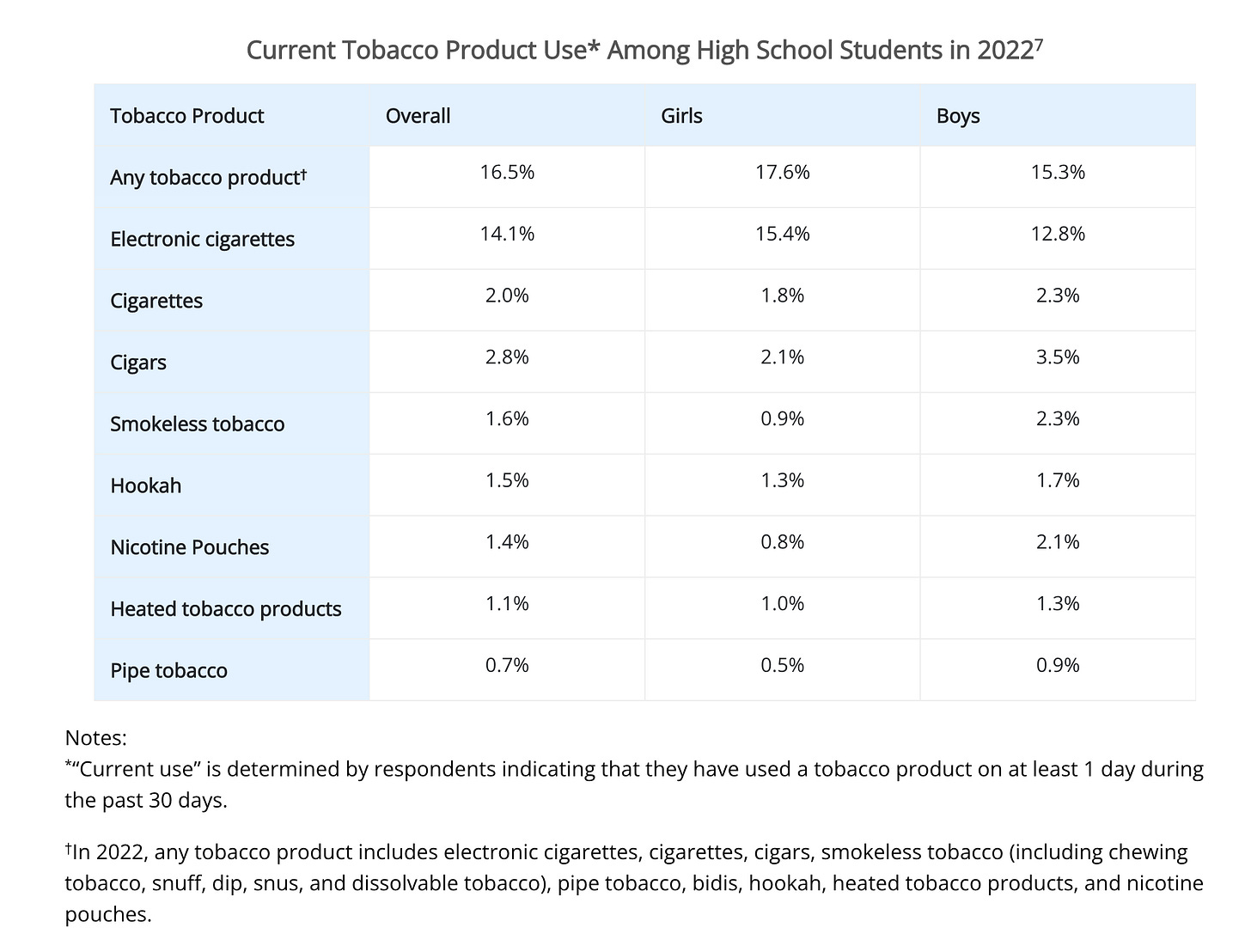
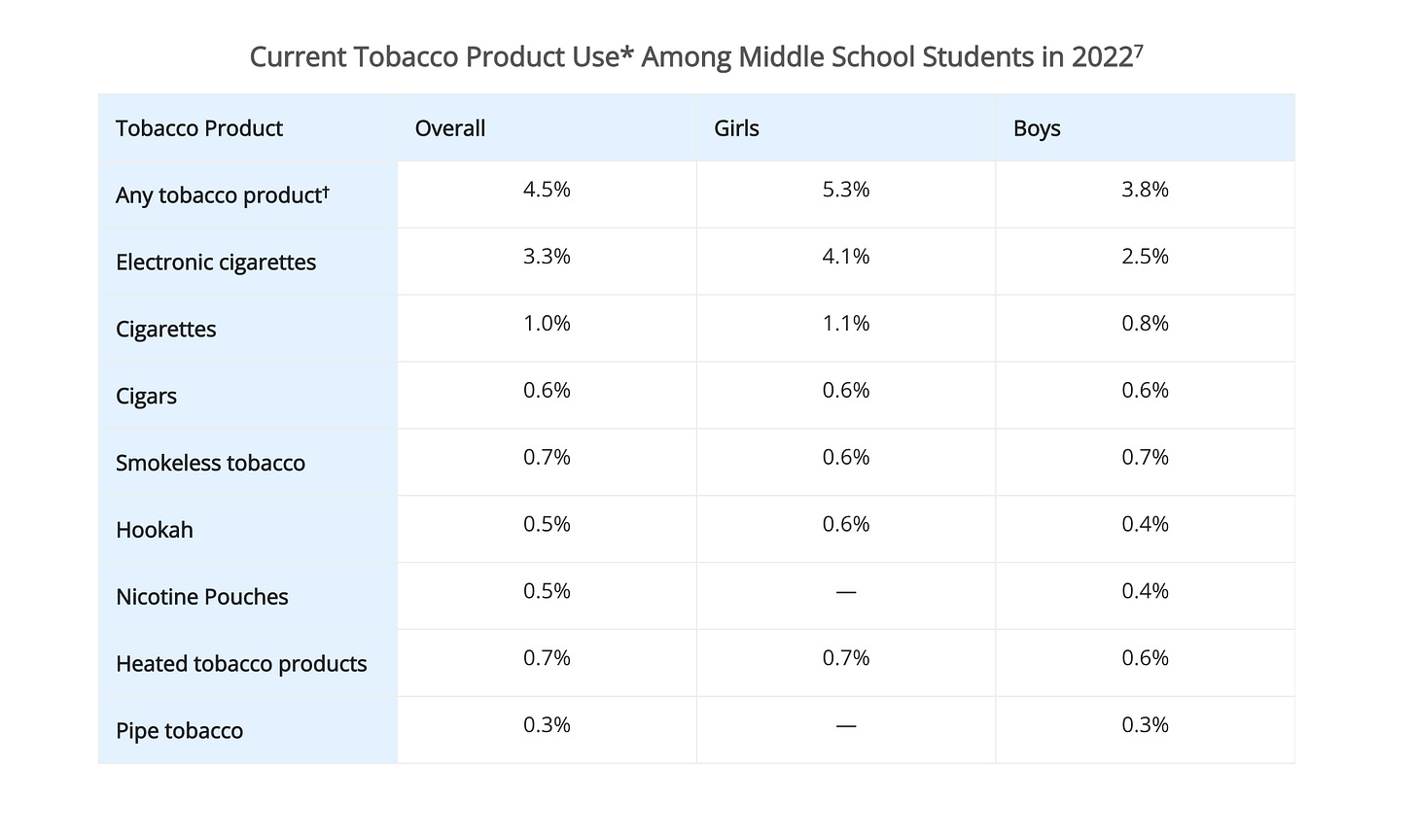
For more information on resources cited, check below.
https://www.cdc.gov/tobacco/data_statistics/index.htm
Bar Harbor Story is a reader-supported publication. To receive new posts and support my work, consider becoming a free or paid subscriber. And thank you so much for being here!

